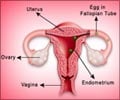Women are at their smartest self when they are ovulating, according to a study.

The researchers took MRI scans of the brains of women during their monthly cycles.
In women not taking the pill, they found an increase in the volume of grey matter in the right parahippocampal and fusiform gyri, areas of the brain involved in spatial location and facial recognition.
This boosts women's abilities to recognise faces, bodies and landscapes, said Pletzer.
In fact, she said that this may help them to locate a high-quality mating partner.
The team found that the effect is short-lived, however. After ovulation, rising levels of progesterone cause the gyri to shrink back.
"The pill may exaggerate typical female behaviours such as superior language skills and memory," New Scientist quoted Pletzer as saying.
Source-ANI
 MEDINDIA
MEDINDIA



 Email
Email




